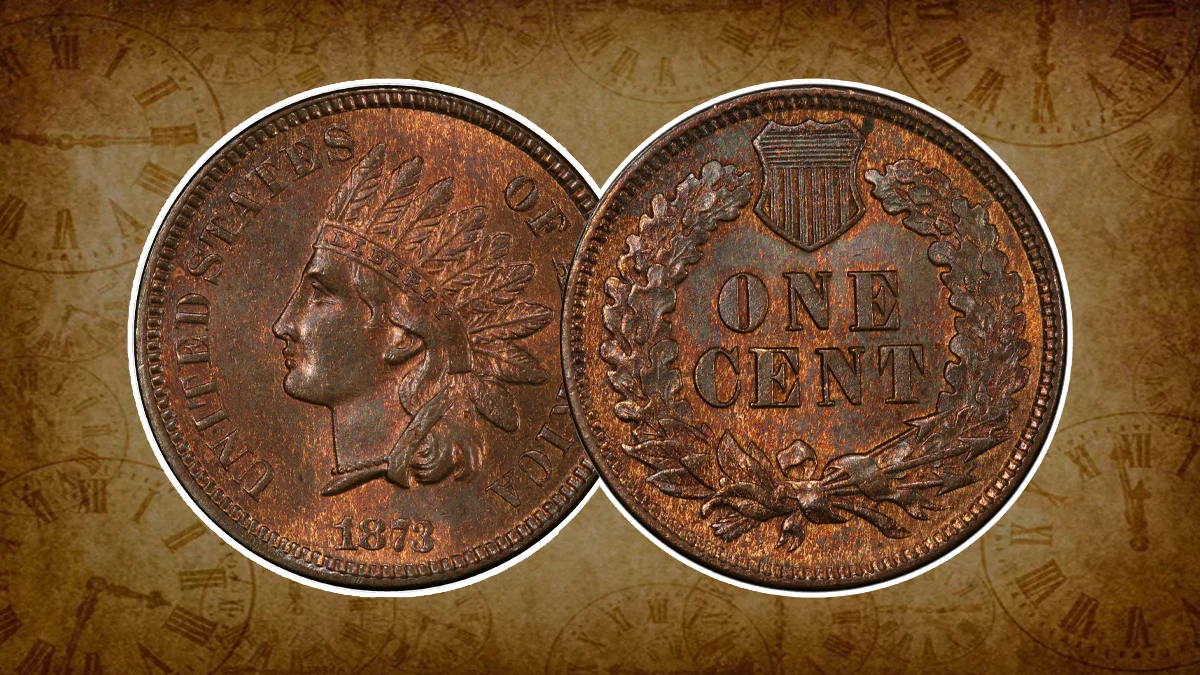
The 1873 Indian Head Penny has a unique place in numismatics because of its historical value and scarcity. This coin, part of the broader Indian Head series, is particularly sought after by collectors, especially those in high condition. In this article, we will discuss the 1873 Indian Head Pennies history, specifications, varieties, rarity, errors, grading, and value to provide a complete overview.
The 1873 Indian Head Penny is a famous coin and it continuously attracted interest from the coin’s enthusiasts because of its scarcity and historical context. It was minted when the economy of the United States changed making it an important coin for collectors. The 1873 penny remains a charming and valuable find in the world of coin collecting because of its rich design and the introduction of varieties within the same year.
History of 1873 Indian Head Penny
The Indian Head Penny series started in 1859. It was designed by James Barton Longacre and continued until 1909. The 1873 penny was minted at a time when the U.S. was transitioning from a bimetallic standard to the gold standard, which affected the circulation and production of coins. This year is especially important because of the two different types of the “3” in the date, known as the “Open 3” and “Closed 3,” which were both made in important numbers but with varying degrees of rarity.
Specifications
- Designer: James Barton Longacre
- Composition: 95% Copper, 5% Tin and Zinc
- Weight: 3.11 grams
- Diameter: 19 mm
- Edge: Plain
- Mint Mark: None ( Minted in Philadelphia)
Types of 1873 Indian Head Penny
The 1873 Indian Head Penny comes in two main types which are based on the design of the “3” in the date:
- Open 3: The space within the loops of the “3” is wider and more open.
- Closed 3: The circles of the “3” are closer together, making a more close appearance.
The Closed 3 type is viewed as rarer and more valuable than the Open 3, with an extra layer of attraction for collectors.
Rarity and Condition
The rarity of the 1873 Indian Head Penny depends on its condition. Coins that have not been heavily circulated and have their original details are much more valuable. The 1873 penny is generally scarce in high grades, especially in uncirculated conditions. Finding a well-preserved example can be difficult, but it significantly improves the coin’s value.
Errors
While the 1873 Indian Head Penny is primarily known for its varieties, errors are less common but can exist. These errors might include misstrikes, off-center strikes, or doubled dies. Any error on an 1873 penny would increase its value considerably, as error coins are highly sought after by specialists.
Grading
Grading plays an important role in the analysis of the value of the 1873 Indian Head Penny. Here’s an analysis of how the coin is considered in different conditions:
- Good (G): The coin is heavily worn, and just the basic outlines of the design are visible. The “LIBERTY” on the headband is soft or not visual at all, and the date and lettering may be worn but should still be different from the edge.
- Fine (F): In this grade, the coin looks moderately worn. The letters in “LIBERTY” are written on it, and the overall design, heaving the feathers in the headdress, has more detail, although still worn.
- Extremely Fine (EF/XF): The coin has light wear on the most elevated points of the design, such as the cheek and feathers. The facts in the headdress and the “LIBERTY” are sharp and clear, with minor flattening.
- Uncirculated (MS): This grade shows that the coin has no wear and has its original mint luster. The facts are sharp, and the coin seems almost as it did when it was first struck, although toning may be present.
Value of 1873 Indian Head Penny
The value of the 1873 Indian Head Penny differs widely depending on its condition and type:
- Good: $20
- Fine: $63
- Extremely Fine: $105
- Uncirculated: $233
For the rarer Closed 3 variety, you can add about 10% to these values, making it an even more valued coin among collectors.
Also Read – 1877 Indian Head Penny: A Guide for Coin Enthusiasts
Conclusion
The 1873 Indian Head Penny is one of the most valuable coins in American numismatic history. This coin is a must-have for professional collectors because of its two features: scarcity and its ability to be of high value in excellently preserved copies. The 1873 penny is a valuable and unique coin, showing both the artistry of the time and the economic developments of the late 19th century, whether you have found an “Open 3” or the rarer “Closed 3” type. For someone lucky to have one, this coin might turn into a thrilling gem through proper grading and close observation of its details, which can greatly increase its value.
